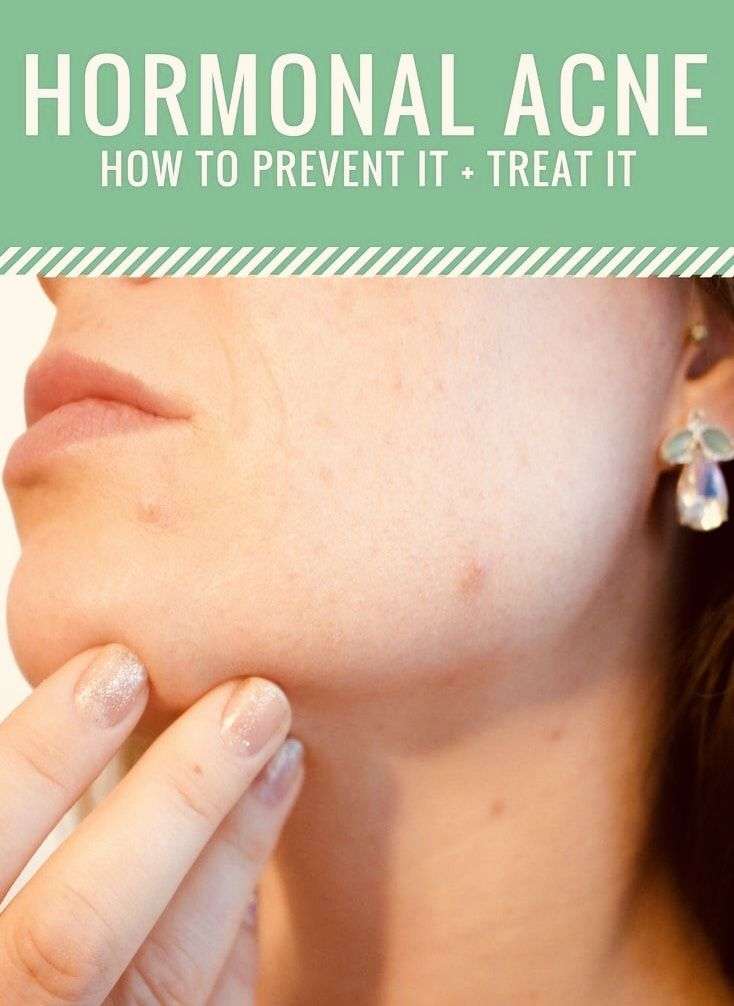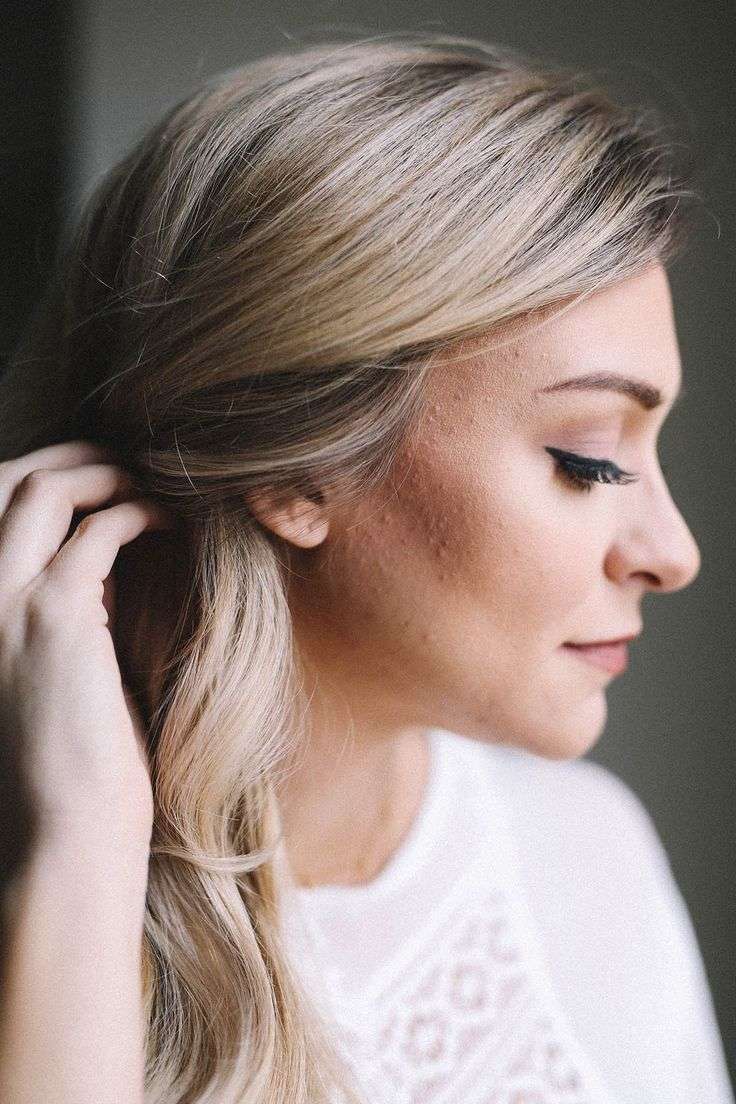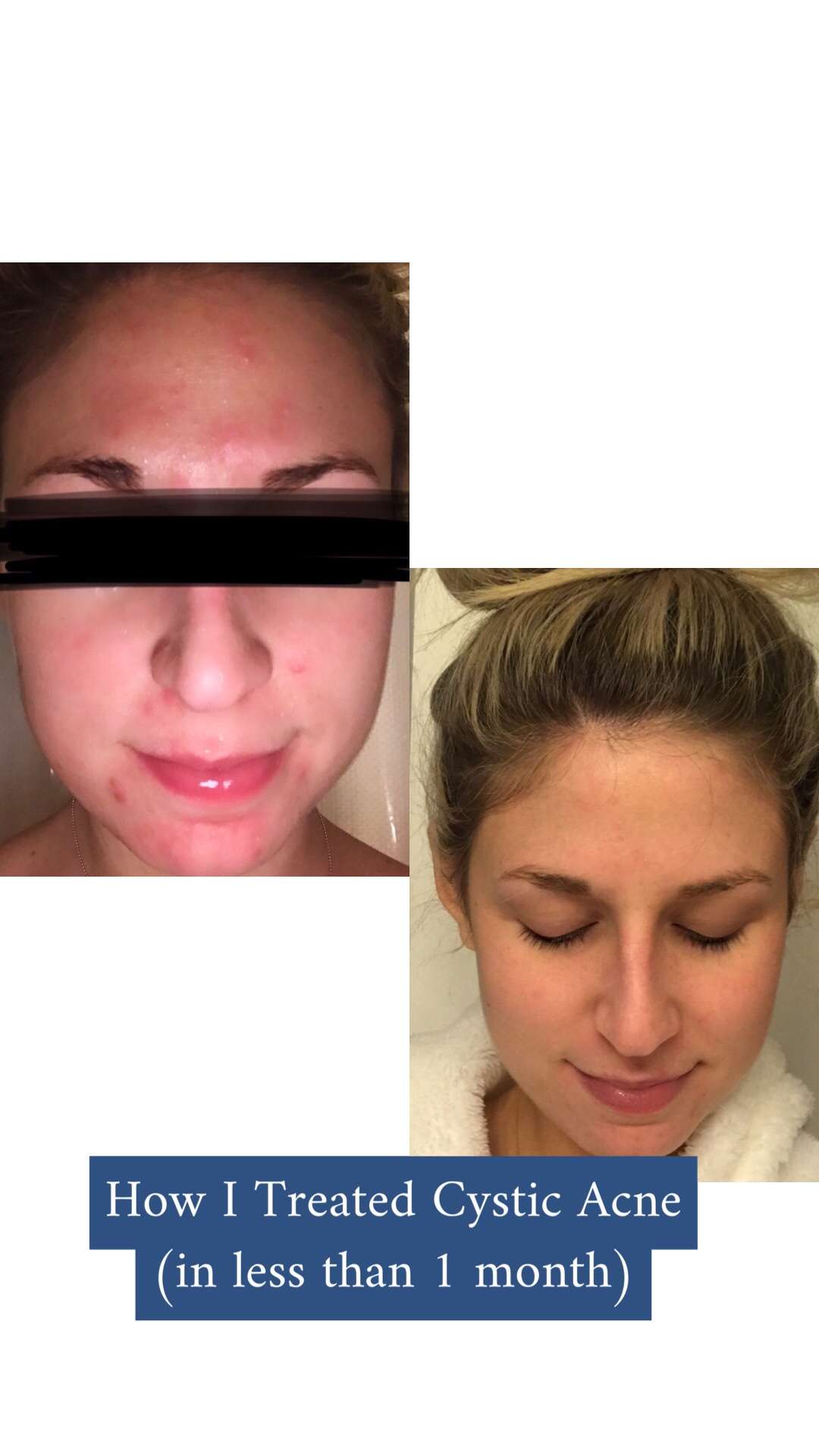What Is Hormonal Acne And Why Does It Occur
Hormonal acne typically occurs during a certain point in the menstrual cycle, often the week before your period. These breakouts usually appear on the jawline or chin.
Although a non-pregnant person can suffer from hormonal acne, it is very common when a person becomes pregnant. “In your first trimester, there is a hormonal surge of progesterone, which is a hormone that makes the uterus a hospitable environment for the baby,” says Mona Gohara, MD, a board-certified dermatologist. “Progesterone can increase oil production and that hormonal surge plus the sebum can start the acne cascade.”
Some hormones level out during the course of pregnancy, which can help acne. This is not always the case, though. “Often, these breakouts decrease as the pregnancy continues into the third trimester, but the response is unpredictable,” says Rachel Nazarian, MD, FAAD, a faculty member at Mount Sinais Department of Dermatology who practices at Schweiger Dermatology Group in New York City. “Many people experience no acne at all, or acne throughout their entire pregnancy.”
Rachel Nazarian Md Faad
Often, these breakouts decrease as the pregnancy continues into the third trimester.
If you do experience better skin in your third trimester, keep in mind that hormone fluctuations are not over. This may mean your acne will reappear.
“Hormones continue to fluctuate during the fourth trimester after the baby has arrived,” says Natalie Aguilar, a dermatological nurse and celebrity aesthetician. “Nursing a baby also stimulates hormones so that our body can continue to make milk. Even if one decides that nursing is not for them, it takes a while for our once-elevated pregnancy hormones to return to normal.” This can delay your return to clearer skin.
Additionally, lifestyle factors while pregnant or while caring for a newborn can also lead to breakouts. “Fatigue can cause our skin to become sluggish and prone to breakouts that may not be hormone-related,” says Aguilar.
So How To Keep Your Skin As Smooth As A Babys Bottom
Treat your skin kindly during this time! Consider using a gentle cleanser to wash your face twice daily, and try to avoid scrubbing your face as this can further irritate your skin. A good moisturizer can be beneficial for hydrating and calming the skin while preventing breakouts. Also consider switching to oil-free cosmetics. If you do want to use a topical acne treatment, consider these pregnancy approved options below.
Don’t Miss: Does Nugenix Have An Estrogen Blocker
How Soon After Treatment Will Hormonal Acne Go Away
Treating acne can be different for each individual, but patience is key. Generally, it could take up to four to six weeks to see improvement in your skin after you begin treatment. Even if you dont notice that the treatment is clearing your skin, it is recommended that you continue treatment to prevent new acne from forming.
Treating Acne While Pregnant

Now that you have a little one on board, treating acne isnt necessarily the same as it was before, and honestly you may be struggling with acne now more than before due to hormonal changes. According to Dr. Kurt Grelck, board-certified dermatologist at Forefront Dermatology in Stevens Point, Wisconsin, Skin changes are very common during pregnancy. Whether or not you decide to treat acne during your pregnancy depends on your skin, your situation, and your dermatologists advice. Mild acne may not need any special treatment at all, and your doctor might suggest waiting until the baby is born before starting a treatment. By that time, acne may have gone away on its own.
I suggest to start treating your skin with common sense skin care: a gentle cleanser both morning and night followed up by a light moisturizer, added Dr. Grelck. Skin is extra sensitive during pregnancy so choose a fragrance-free product and cleanser that is matching your current skin type .
Treatments Generally Considered Safe
While the treatments below are considered safe to use during pregnancy, you should talk to your doctor before using any acne medications.
Treatments to Avoid
Many acne treatment medications can harm a developing fetus and must be avoided during pregnancy, added Dr. Grelck. Always let your dermatologist know you are pregnant before being treated for acne.
Skin Struggles?
Don’t Miss: Nugenix Estro-regulator Review
Take Good Care Of Your Skin
The most effective way to deal with hormonal acne is to take good care of your skin. A good skin care regimen helps keep your skin healthy and prevent acne breakouts.
- Always clean your face gently with a mild cleanser. Wash it twice a day, once in the morning and again at night before going to bed. Cleansing your face properly helps prevent accumulation of oil and dirt that can clog your pores and contribute to acne.
- Exfoliate your skin once a week to get rid of dead skin cells.
- Try not to touch your face unnecessarily with dirty hands.
- Choose your skin care products carefully and avoid using lots of makeup on your face.
- When suffering from acne or other skin issues, do not try to squeeze or pop the pimples, as it can increase the risk of infection and result in permanent scars.
When Pregnancy Acne Clears Up
There’s no concrete answer for when pregnancy acne will clear up, especially for those with preexisting acne.
“While no studies definitively give a timeline for acne resolution postpartum,” Campbell says, “it can be deduced that as the hormones and immune function return to baseline that the acne will also resolve if it did not exist prior to pregnancy.”
Also Check: Can Having Your Tubes Tied Cause Hormonal Imbalance
Why Acne During Pregnancy Is Common And How To Get Rid Of It
Written by Support on . Posted in Blog, Obstetrics.
Everyone talks about the glow that comes with pregnancy but for many, the increase in oil secretion can cause breakouts, even in women who havent had acne for years. Theres no culprit that we can blame for acne during pregnancy, but dermatologists project that these breakouts are caused by the same thing that causes them during teenage years: hormones. Specifically, a hormone called androgens. If you are breaking out during your pregnancy, heres what you may want to know about how long it will last, why it happens, and how to safely treat it.
What Products Arent Safe For Pregnancy Acne
Many of the creams and meds that are typically used to zap zits contain ingredients that could potentially harm your growing baby, so youll want to steer clear. Acne products to avoid during pregnancy include:
- Retinoids. Serious breakouts in adults are sometimes tackled with such strong-arm products as Retin-A and other topical retinoids . All of these are completely off-limits until after you deliver and wean, since they can be absorbed through the skin into your breast milk and your and your babys bloodstream.
- Doxycycline and minocycline. These are another definite no-no, since their use during pregnancy can negatively affect your baby. In fact, its best to avoid virtually all oral acne medication during pregnancy .
- Oral isotretinoin. It poses the risk for birth defects, premature birth or miscarriage.
Topical salicylic acid and benzoyl peroxide, two chemicals found in a huge range of skin care and drugstore products, are generally okay to use in small amounts during pregnancy, according to American College of Obstetricians and Gynecologists as well as the American Academy of Dermatology .
However, not all experts consider them safe for expecting women. If youre considering using a product containing one of these ingredients, talk with your doctor first.
You May Like: Can Having Your Tubes Tied Cause Early Menopause
Medication Or Natural Remedies
The acne treatments available work by controlling the production of sebum and clearing the clogged pores. You can choose to use natural remedies or medication to treat pregnancy acne. There are many acne products that contain benzoyl peroxide and salicylic acid. These ingredients kill acne-causing bacteria and they clear the pores of dead skin cells and oil. Pregnant women can use products that contain these ingredients quite safely. It is, however, important to know that the ingredients can cause skin peeling, dryness, and irritation.
Does Pregnancy Acne Go Away After Birth
It would be nice if those pesky pimples went poof the moment your baby was placed into your arms. While pregnancy acne does eventually get better as your hormones return to their pre-pregnancy state, it doesnt always happen overnight.
In some cases, postpartum hormonal fluctuations paired with sleep deprivation and the stress of caring for a newborn can be yet another acne trigger.
Try to stick with the same healthy skin care habits you had during pregnancy . And ask your doctor about the acne treatments that were off-limits during your pregnancy. Even if youre breastfeeding, some topical treatments may now be okay.
Hormonal birth control may help too. If the pill had helped keep your acne in check before becoming pregnant, youll likely notice an improvement in your skin once you start taking it again.
Keep in mind, though, that the mini-pill a progestin-only birth control pill often recommended for breastfeeding moms wont help acne and can actually make it worse.
Above all, try to be patient. A fresh wave of postpartum pimples isnt fun. But eventually, your skin will settle back down.
Also Check: Does Kaiser Cover Hormone Replacement Therapy
Cystic Chin Acne Causes And Treatments
Cystic acne are bumps or pimples that develop on the same spots characterized by red and swollen clogged pores. When these bumps are infected with microorganisms like bacteria they dig deeper into the skin dermal layer and become tender bumps. Cystic acne is more common in men but women are not exception.
Some of the causes of cystic acne include hormones . In women similarly, menstruation cycles, menopause or polycystic ovary syndrome are some of the major causes linked to this type.
Cystic Chin treatment
As we have seen cysts may also share common symptoms such as pores getting clogged and becoming swollen. We shall not delve it treatments but rather mention them randomly.
If the cysts on chin dont respond to the above treatment as in the case of severe cystic acne, then you need an advanced cures.
How Can I Get Rid Of Acne During Pregnancy

Treatments that are considered safe to use during pregnancy include salicylic acid, azelaic acid, benzoyl peroxide, and certain laser therapy treatments. However, there are several acne medications that can cause miscarriages and severe birth defects, so always check with your doctor before taken any acne medication during pregnancy.
Read Also: Does Nugenix Have An Estrogen Blocker
Try Blue Light Therapy
If you already have pimple-causing bacteria inside of your pores, blue light therapy can banish bacteria, and the inflammation that comes with it. “Blue light therapy is safe and works as an antibacterial treatment to combat P. Acnes living and causing inflammation in the sweat glands,” says Greenfield.
Try An Oral Contraceptive To Balance Hormones
If you’re comfortable and if a gynecologist says you’re a good candidate, oral contraceptives can help balance out your hormones, including those that are responsible for acne. Zeichner says that the best prescription options for hormonal acne are birth control pills and Spironolactone . Birth control pills help regulate your hormones and decrease testosterone levels, which can mean fewer hormone-induced breakouts. Zeichner notes the four birth control pills currently approved for acne: Yaz, Beyaz, Ortho Tri-Cyclen, and EstroStep.
Another option is the aforementioned Spironolactone. Though not specifically designed to treat acne, it is often used for exactly that purpose because it prevents testosterone from stimulating the oil glands. “Less oil means less shine, fewer clogged pores, and less food to feed acne-causing bacteria,” Zeichner explains.
“Certain oral contraceptives have even been approved by the FDA to be used in the treatment of acne,” explains Fenton. “If you are already on birth control or thinking of going on it, make sure to ask your gynecologist for an oral contraceptive that will also help your acne.”
“In addition to clearing existing acne, Differin Gel will also help to prevent future breakouts from forming by increasing skin cell turnover to minimize clogging of pores.” Additionally, Fenton recommends using an OTC acne wash and non-comedogenic moisturizer regularly.
Read Also: Nugenix Estro Regulator Review
Banishing Breakouts When Pregnant Or Breastfeeding
For very painful or severe cases of acne, whatever the cause, there are intensive medical options like cortisone shots and even light therapy, which can be discussed with a dermatologist. Light therapy can be safe during pregnancy, but then you have to consider the possibility of it exacerbating melasma, says Cohen. Pregnancy melasma is a condition that causes dark spots on the face, often across the cheeks, nose, upper lip and forehead, triggered by exposure to light.
Treating even a moderate case of pimples during pregnancy is tricky. A lot of the ideal medications that we use for acne are contraindicated for pregnancy, says Cohen. Oral retinoids have been linked to birth defects. Medications that regulate hormone levels, like the pill and spironolactone, as well as the often-prescribed antibiotics used to treat severe cystic acne are also off-limits prenatally and while lactating, he says.
Those seeking a more natural solution may want to look into taking an omega-3 fatty acid supplement. Fish oil is something I would absolutely recommend for acne because its anti-inflammatory, says McLaird. Other key supplements for clear skin can include vitamin D and probiotics, she says.
Brabazons son is now two, and yet shes still experiencing breakouts, especially on her neck.
How To Remedy Acne During Pregnancy
If youve suffered with acne before, you might feel that you can treat this new bout of acne by stocking up on products that youve used in the past.
However, acne care during pregnancy requires a lighter touch.
Not only is your skin likely more sensitive, many common acne treatments are strictly off-limits during pregnancy.
This is because some chemicals used in acne treatments both topical and oral pose a risk to the unborn baby.
These risks include birth defects and an increased risk of miscarriage.8
Acne treatments which are unsuitable for use during pregnancy include:
- Oral retinoid medicines including acitretin, alitretinoin and isotretinoin. These are a strong synthetic form of vitamin A used to treat more severe acne.9
- Topical retinoids are less likely to cause harm to the unborn child. However, as a precaution, they must not be used during pregnancy and by women planning to have a baby.10
- Trimethoprim an antibiotic sometimes used to treat acne.11 It may lower levels of folic acid in the blood and interfere with a babys healthy development.12
- Tetracycline an antibiotic sometimes used to treat acne which can cause tooth discolouration in babies and bone growth issues.13
- Hydroquinone this topical depigmenting agent is not advisable for use during pregnancy due to its high absorption rate.14
Acne-fighting ingredients which can be used during pregnancy include:
Always check with a healthcare professional first before starting any treatment.
You May Like: Can Having Your Tubes Tied Cause Hormonal Imbalance
How Can I Reduce My Risk Of Hormonal Acne
Though hormonal acne can be unavoidable, there are several things you can do to reduce your risk of getting breakouts:
- Make lifestyle changes to reduce stress, get better sleep and eat a healthy diet.
- Use skincare products that wont clog pores.
- Discuss treatment options with your healthcare provider for persistent acne.
Causes And Prevention Of Pregnancy Acne
Acne is the most common skin disorder in the United States, and affects up to 50 million people, according to the American Academy of Dermatology. Acne symptoms occur when the body produces too much sebum, or oil, which then becomes clogged within pores with dead skin cells to form a bacteria called P. acnes. The condition of acne can be triggered by a number of things, including genetics, stress, and namely, hormones, which is most often the culprit when it comes to pimples during pregnancy.
Recommended Reading: Can Having Your Tubes Tied Cause Hormonal Imbalance
What Is The Best Topical Treatment For Women With Hormonal Acne
The same as teen acne adult acne treatment should be personalized to the skin type and acne and acne severity type. The best topical ingredient for mild hormonal acne is salicylic acid, retinol, niacinamide, and benzoyl peroxide for moderate acne. Benzoyl peroxide is regarded by the American Academy of Dermatology as the best FDA-approved single anti-acne ingredient. It is frequently more effective than any other over-the-counter prescription acne medication. Unlike adapalene , they are often very irritating new preparation of micronized benzoyl peroxide 2.5% can be used on acne-prone and sensitive skin without significant side effects.
The best cleansers for women with hormonal acne include a low percentage of salicylic acid. Salicylic acid at a concentration of 0.5% can help unclog the skin pores without over-drying the skin. Plant-based ingredients can further help fight skin inflammation and reduce the dryness and redness frequently associated with regular anti-acne cleansers.
Choosing the right moisturizer is crucial for women with hormonal acne. Anti-wrinkle moisturizers can increase the risk of acne breakouts. For best results, look for moisturizers oil-free and specially formulated for acne or acne-prone skin people. Women with normal – oily skin can benefit from an active moisturizer with niacinamide, and women with drier skin can befit from a more hydrating moisturizer.
Whatever You Do Don’t Pop

Adolescents typically get pimples everywhere, and they’re prone to whiteheadsthose raised orbs that call out to be squeezed. Women, on the other hand, often break out around the jawline, chin, and mouth, and pimples look red and feel inflamed rather than poppable, Dr. Nazarian says. Plus, skin heals more slowly as you age, so an errant, scab-inducing “squeeze” can take weeks to vanish.
Also Check: Melatonin And Unisom Together